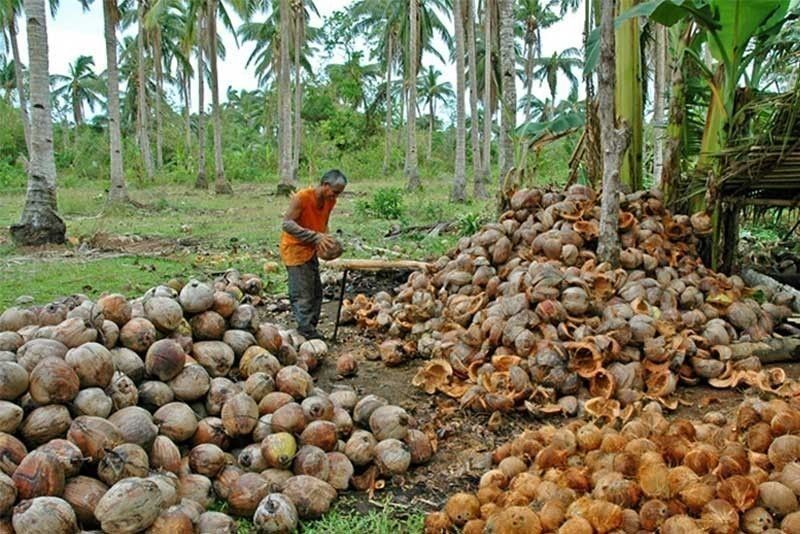‘Coco levy bill vetoed due to lack of safeguards’

MANILA, Philippines — The coconut levy bill vetoed by President Duterte was prone to corruption just like the pork barrel funds, Malacañang said yesterday as it urged Congress to craft a better law that would protect public funds from irregularities.
In his veto message dated Feb. 8, Duterte said the bill lacked “vital safeguards to avoid the repetition of painful mistakes in the past.”
The measure, he added, did not reflect the ultimate goal of accelerating the full use of coconut levy assets and funds for the benefit of coconut farmers and the coconut industry. He did not provide specifics.
Presidential spokesman Salvador Panelo revealed that Duterte was against a provision that would have prevented the executive branch from overseeing the implementation of the development of the coconut industry.
“The P10 billion in annual appropriation for the development of an industry whose implementation is placed on an agency not required to seek approval from the executive branch is susceptible to corruption akin to creating pork barrel funds,” Panelo said in a statement.
“The oversight functions over the Philippine Coconut Authority (PCA) are placed only with Congress. Specifically, the strengthened PCA Bill mentions an oversight to be exercised by the Coconut Farmers and the Industry Oversight Committee to the exclusion of the executive branch,” he added.
He also claimed that the bill gave a reconstituted PCA various functions including the sale, disposition or dissolution of coco levy assets without checks and balances.
“Such condition will diminish the ability of the Department of Justice, through the Office of the Solicitor-General in coordination with the Presidential Commission on Good Government to act on cases relating to coco levy assets,” the spokesman said.
Panelo said the President had also rejected the composition of the reconstituted 15-person PCA Board, seven members of which were supposed to come from the private sector.
“A receipt of P10 billion by the board from taxpayers’ money therefore translates to permitting private persons to influence the disbursement of public funds,” he pointed out.
Aside from those, the PCA setup was also reportedly similar to that of the Road Board, which was heavily criticized for allegations of corruption and misappropriation of funds.
Panelo claimed that under the bill, the PCA board was given full authority to disburse P10 billion every year “in perpetuity without a terminal date, and subject only to review by Congress after six years.”
“The veto of the bill will give Congress more time and opportunity to improve the formulation of the PCA and the distribution of coco levy funds. The veto by (President Duterte) of the legislative measure is a reflection of the principled stand of this administration in promoting good governance and public accountability,” he added.
Meanwhile, some lawmakers said over the weekend that farmers and other stakeholders would have to work hard and fast to come up with a new measure that will allow them to benefit from the P100-billion coco levy fund.
Sen. Cynthia Villar, principal sponsor of the measure, said it was unfortunate that Duterte did not sign the bill into law.
“However this does not mean that all hopes are lost for our 3.5 million coconut farmers who have waited for decades to benefit from the coconut levy funds,” said Villar, who chairs the Senate committee on agriculture and food. “Certainly, this will not discourage us until we see the day when our coconut farmers, who are among our country’s poorest, benefit from the fund that is rightfully theirs.”
She said she was willing to work with the President to come up with a new bill.
The bill seeks to provide greater farmer representation in the PCA board by allowing six farmer-representatives to join four government-representatives and one from the coconut industry.
Sen. Francis Pangilinan said Duterte’s veto of the bill “has put a cloud of uncertainty on when the country’s coconut farmers would finally be able to benefit from the coco levy fund.”
“However, the veto means we are back to square one. We urge fellow advocates of the coconut farmers’ cause to stay the course and again work on the proposed law that would truly be beneficial to the farmers and the industry,” the senator said in a statement.
The bill sought to change the composition of the PCA, which is tasked under a separate measure, to manage a P100-billion trust fund for coconut farmers as well as manage coco levy assets recovered by the government from the Marcoses and their cronies.
While Pangilinan lamented the delay in release of benefits and assistance to coconut farmers as the trust fund “is their money from years of toil and sweat,” he acknowledged that the measure was not reflective of the farmers’ sentiments and needs.
In a one-page letter sent to the Senate and the House of Representatives last week, Duterte said the bill does not have enough safeguards to ensure that the funds for coconut farmers would be protected and that there will be no repeat of the coco-levy fund scam in the past.
“The powers given to the PCA under the proposed measure, read together with the proposed ‘Coconut Farmers and Industry Development Act,’ undermine relevant regulations and safeguards that were established to precisely avoid abuses,” Duterte said. – With Paolo Romero
- Latest
- Trending


























